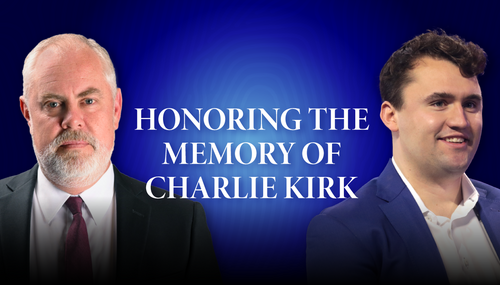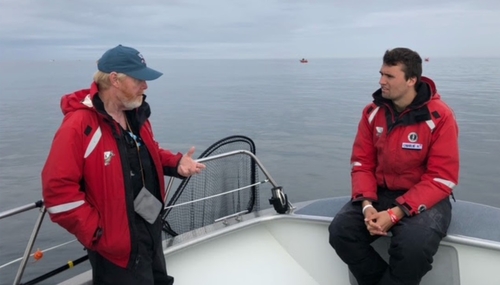Former Democratic strategist turned journalist George Stephanopoulos on Tuesday suggested that it might be a good idea for the Barack Obama, during his address to Congress on Wednesday, to tell Americans to "calm down." Appearing on Good Morning America, the This Week host also lobbied the President to claim that his health care plan would not increase the deficit.
Stephanopoulos bizarrely enthused to co-host Robin Roberts: "...He's got assure people that this is not going to increase the deficit. I think that is one place where the President will say, ‘I can't sign a bill if it increased the deficit by even one dime.’" Of course, the Congressional Budget Office asserted that House Democratic legislation would add $230 billion to the deficit.
Earlier in the segment, again speaking for the President, Stephanopoulos mused, "Number two, rhetorically, will he say to the country, ‘I hear you. I know you're concerned about this. I know you're concerned about the size of the program. I know you're, perhaps, concerned that we've gone too far, too fast. Calm down. We're going to take it one step at a time.’"
On September 3, 2009, Stephanopoulos offered more free advice, telling Obama he must "intimidate Republicans a little bit" and "make sure they understand the consequences of failure."
A transcript of the September 8 segment, which aired in the 7am EDT hour, follows:
ROBIN ROBERTS: For the bottom line we turn to chief Washington correspondent and host of This Week, George Stephanopoulos. And, George, it has already been said countless times: Make or break speech. Bottom line here, how important is tomorrow’s speech?
GEORGE STEPHANOPOULOS: Couldn’t be more important, Robin. I mean, the White House knows that this is their last chance to get a national audience, a full national audience before Congress votes on these health care proposals, the full House and the full Senate, vote. They had hoped to give this joint session after there had been a full vote by the House and the Senate. But, of course, everything got stalled earlier in the summer. So, what they know they have to do tomorrow is, number one, fire up the President’s base. Number two, reassure Americans who have real concerns about the plan. But, number three, and most importantly, they have to make sure that every American comes out of tomorrow night’s speech knowing exactly what the President wants to do.
ROBERTS: And, George, do you think we got a sense of that in his speech yesterday? Granted, it was a very receptive audience: the AFL-CIO Labor Day picnic. But, he really came out swinging. What might we see tomorrow night?
STEPHANOPOULOS: Well, I think we’ll see some of that. But, that’s only going to be part of it. That was a partisan audience yesterday. That was an audience of presidential supporters. Number two, the President’s going to have to reach out beyond that and do a couple things that answer the questions raised about the plan over the summer? Is it going to increase the deficit? Is it going to be a government takeover? He’s going to deny that. Number three, I think he is, though, going to have to do more to reach out to the broad middle of the country and throw out the olive branch of bipartisanship. I think there’s two big questions: Will he incorporate any new Republican ideas or ones they’ve been fighting for, like malpractice reform? Number two, rhetorically, will he say to the country, "I hear you. I know you’re concerned about this. I know you’re concerned about the size of the program. I know you’re, perhaps, concerned that we’ve gone too far, too fast. Calm down. We’re going to take it one step at a time."
ROBERTS: But, do you have any idea what components of a bill are a must? I know you talked to White House Press Secretary Robert Gibbs on Sunday and he did indicate that the President will draw a line in the sand, so to speak.
STEPHANOPOULOS: Yeah, he did. On this public health insurance option, he’s going to fight for it. But, bottom line, he’s not going to veto the bill over it. I think the bottom line is that the President’s needs are [sic] is that it has to move towards expanding coverage for everyone and making sure people that have coverage don’t lose it. Number two, it’s got to control costs. Costs are not going to go up for most Americans. That’s got to be a bottom line for the President. Number three- And- and, perhaps most important on this one, he’s got assure people that this is not going to increase the deficit. I think that is one place where the President will say, "I can’t sign a bill if it increased the deficit by even one dime."
ROBERTS: That might be a tough sell. I mean, that’s what people are- they have in their mind and that’s something he has to try and convince them about. But, he is going to meet with Democratic leaders today. There’s a lot that’s going to take place between now and when he makes that speech tomorrow.
STEPHANOPOULOS: He is. He’s going to meet with the leader of the Senate, Harry Reid and the Speaker of the House, Nancy Pelosi, today at 2:45 to try and get them on board with strategy. Also, meet with progressives- he’s gone a half way to solve some of their concerns by saying he’s going to fight and argue for this public option. But, they’re not going to be satisfied with him saying that he’s not going to veto the bill over it. His message back to them is what’s more important? Covering everybody, making sure people have the- get to keep the coverage they have or the means of getting there, this public health insurance option? He’s going to try and force them into a corner and say it’s much more important to get there than to focus on one method of getting there.




